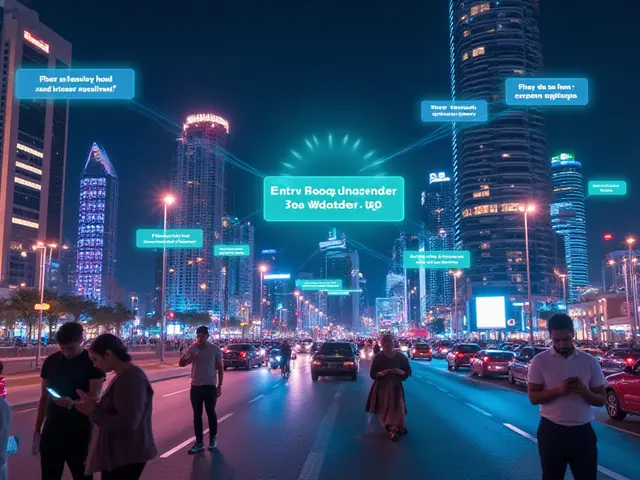Dubai’s glossy skyscrapers, designer hotels, and lavish party culture draw travelers from everywhere. Whispered about even in high-end lounges, the world of call girls is tucked just beneath the city’s dazzling façade. Before you even think of dipping a toe in that water, you need to know: Dubai doesn't play by the same rules as London, Amsterdam, or New York. The stakes are way, way higher. That’s not just street talk—run-ins with the law can change your holiday plans overnight. Yet, the underground hospitality scene is as much a part of Dubai’s nightlife as gold-plated supercars and late-night shawarmas. Here’s what tourists should actually know.
Understanding Dubai’s Laws and the Legal Landscape
Dubai’s rules around sex work are strict, shaped by the UAE’s deeply conservative approach to personal conduct. Prostitution in any form—whether it’s escort services, street activity, or anything that smells like commercial sex—is illegal. The penal code spells it out, and undercover operations are common, especially in upmarket hotels popular with international guests. The law comes down hard: hefty fines, jail time, and instant deportation top the list of consequences. Even messaging someone about paid companionship can trigger criminal charges. The government runs regular crackdowns, and if you’re caught, you won’t talk your way out, no matter your nationality or how well-connected your local friends are.
The city also has cybercrime laws that reach into private chats. Police can use WhatsApp messages and dating app conversations as evidence. And it’s not just about residents—tourists often get caught out, thinking the city’s flash translates to leniency behind closed doors. Mistaking the luxury for liberty is a rookie error. Hotels, for their part, take guest lists, IDs, and even late-night lobby visits seriously. Some ban visitors to guest rooms. High-end spots have security who clock regular faces—and tip off police if things seem off. The local phrase is "keeping up appearances," but make no mistake: this isn’t lawless nightlife. The stakes for tourists are high, and the margin for error is close to zero.
It’s not all scare stories. Dubai’s hospitality industry knows it straddles a fine line. Some venues are notorious (in a way that’s not exactly secret), but they’re constantly changing, with police intervention making them shift locations or go cold. Expats might share private numbers or run “introductions” under the guise of modeling agencies or massage services, but everything runs on whispered names and trusted networks. The bar is high, the risk is even higher, and that atmosphere shapes the whole experience for visitors thinking about going down this road.
Where the Nightlife and Call Girl Scene Overlap
Walk into any five-star hotel bar in Dubai on a Friday night, and you’ll see a world that feels like Monaco, but with more rules. The city’s best-known nightclubs and lounges attract businesspeople, celebrities, and models—as well as those offering discrete companionship. But it’s not the wild free-for-all that movies would have you believe. Under the surface, the lines between genuine partygoers, hostesses, and professional companions are blurred, but always present.
Malls, beach clubs, and rooftop bars are places where Dubai’s social scene crackles, but the gold rush isn’t out in the open. You’ll notice elaborate codes—brands and acquaintances drop hints without outright saying anything. There are infamous bars in Deira, near the airport, and at the edge of the Marina, known for their transient after-midnight crowds. Some places like these have reputations, surviving for years thanks to tight relationships between owners and local authorities. But even regulars will tell you: everything is discretion. Security staff keep a close eye on unruly behavior, and police occasionally walk through plain-dressed.
The city’s most in-demand call girls rarely cold-approach in public. Instead, private arrangements often start online, through third-party introductions or encrypted apps. Some agencies exist mainly to provide "hostesses" for private parties, blending into VIP gatherings. If you’re from out of town, don’t get fooled by street approaches—these are often scams or even stings. The real action, such as it is, runs through trusted circles and rarely breaks cover. So if you find yourself approached by someone who seems too direct, remember, it’s probably not legit—and you’re risking more than just embarrassment.

Online Arrangements: What Actually Happens?
While you might find social media profiles, dating apps, and even flashy websites claiming to offer "companions" or "escorts" in Dubai, it’s not as simple as swiping and texting. Many of these sites are honeytraps set up by scammers—or, in rare cases, undercover police operations. Payments add another layer of risk, since wire transfers, digital wallets, or straightforward card payments can be traced. Some expats and wealthy visitors use closed WhatsApp and Telegram groups with private vetting, but even these have been infiltrated. Part of the reason is that Dubai’s cybercrime police are notorious for tracing digital footprints, and they’ve been known to arrest both buyers and sellers using chat logs as evidence.
Uber apps and regular taxis are sometimes used for discreet pickups and drop-offs, but drivers are encouraged to report anything they find suspicious. Transfers to and from hotels are monitored after late hours, especially in central locations. Newcomers might think about arranging a meeting at a hotel bar and heading upstairs, believing anonymity is guaranteed. But hotel staff are used to spotting the signs, and visitors often report being stopped in lobbies or denied access altogether. Getting aggressive with front desk staff won’t help—they’re following the law, not being difficult for fun.
For those tempted by online "deals," the risk goes beyond the law. Scammers often request deposits for companionship services, then vanish in the night. Some set up webcam chats or offer photos, only to use personal information for blackmail. And if something feels off, it probably is—there’s a reason why so many experienced Dubai expats steer clear of these services, no matter how slick the Instagram accounts look.
Safety, Scams, and Smart Choices: What Travelers Get Wrong
This is where the tourist fantasy can run headlong into the harsh reality. Visitors come expecting Dubai to work like other party capitals, but they miss the unique cocktail of hospitality and surveillance that defines the city. First-timers get caught out by touts handing out cards or offering numbers near hotels and clubs. Almost all of these are setups leading to scams, theft, or worse. Sometimes it’s as blatant as being handed a business card by a stranger in the street; other times, it’s a slick pitch in a club bathroom. Rule of thumb: if it feels like a hard sell, it’s either an opportunist or a sting.
If you connect with someone genuinely—maybe a conversation in a bar or at an expat party—that’s your business. But even then, inviting a new acquaintance up to your hotel room can be a minefield. Some foreigners have reported theft, credit card fraud, and even threats. Police won’t have much sympathy if the whole story comes to light, particularly if any transaction was implied or exchanged. The safest play is to keep things public, and if you’re uncomfortable at any sign, walk away.
Real personal safety means having your wits about you and prioritizing your own comfort. Avoid anyone who seems too eager or pushy. Refuse any direct offer of illegal activity. Don’t share hotel details or room numbers with strangers—even if they look glamorous or seem trustworthy. Keep cash, valuables, and passports locked up, especially if you do invite someone to your space. Friends who live in the city will tell you that respectful, drama-free nights are the hallmark of Dubai’s nightlife for good reason—the consequences for crossing the lines can be much steeper than anywhere else in the world.

What Tourists Wish They’d Known Before
The truth is, Dubai’s restrictive laws aren’t just for show. They are enforced, and the authorities watch foreigners closely. Social media is crawling with stories from visitors who got in too deep too fast—fines running into the thousands, jail time for what started as a flirtation, and holidays turning into months-long legal nightmares. You won’t find high-profile news headlines because the government protects Dubai’s luxury reputation by keeping details private. Deportation is often swift, but not before you’ve paid a heavy price—fines, confiscation of goods, or mandatory jail time while your case is reviewed.
A lot of tourists don’t realize how much they’re watched. The city’s expansive CCTV network covers malls, hotel lobbies, and even elevators. Hotel registration laws are strict; every visitor is checked in and out with ID. Even if you get away with breaking the rules, word gets around fast. Employers and business contacts often receive discreet updates from local authorities; reputations get shredded quietly, not with a bang but with a whimper. It’s not just police you have to worry about—scammers take advantage of tourists’ naivety, running everything from fake driver scams to elaborate blackmail rings using stolen phones and hacked devices.
For anyone tempted to dip a toe into this world, the best advice might just be to stick to Dubai’s legendary nightlife, amazing restaurants, and jaw-dropping experiences. If you’re curious, enjoy the stories and maybe chat with locals about the city’s hidden side—but don’t make the mistake of believing you can skirt the rules unnoticed. Dubai is a city built on spectacle, but it’s underpinned by a set of boundaries you cross at your peril. If you do decide to explore, let it be on your own terms and with eyes wide open to the risks.






